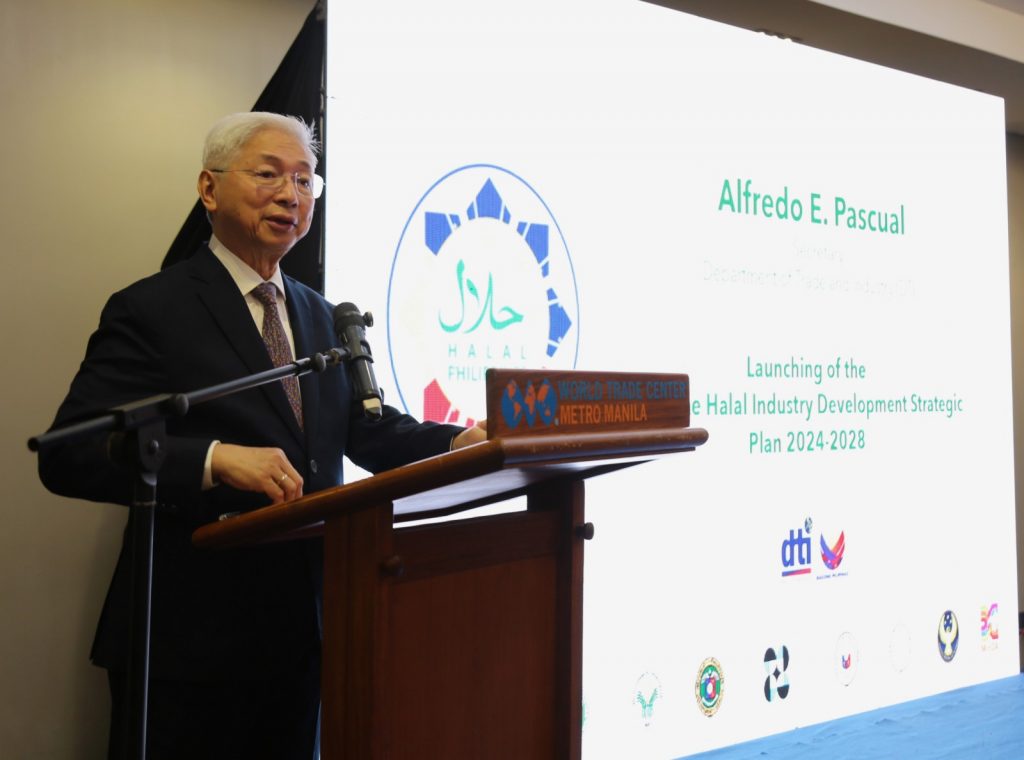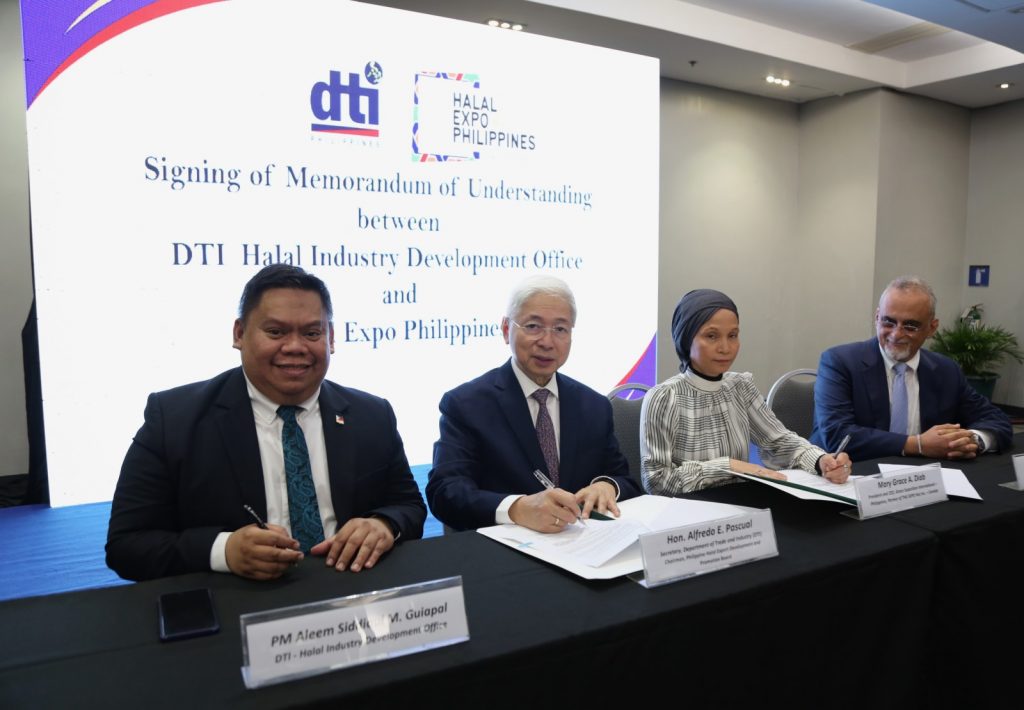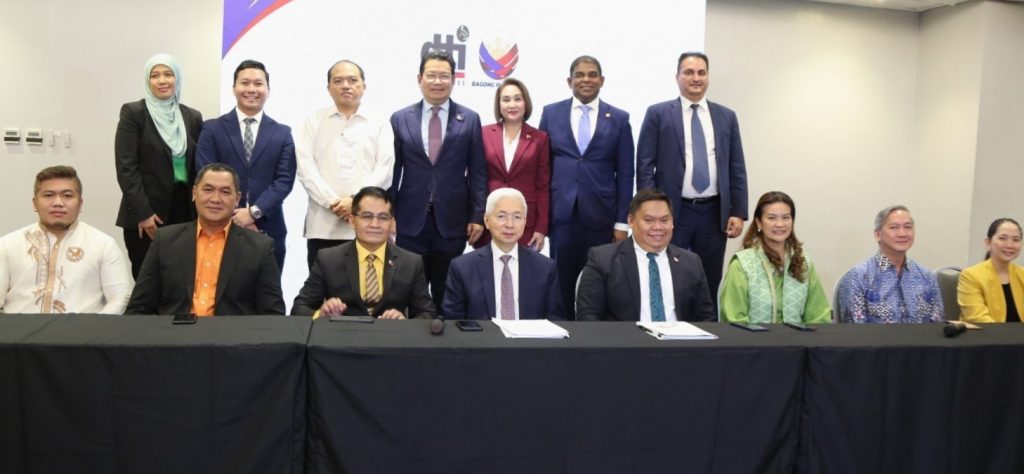
PASAY CITY– On 23 January 2024, Department of Trade and Industry (DTI) Secretary Fred Pascual amplified the Department’s commitment to position the Philippines as the fastest-growing Halal hub in the Asia Pacific region during the launching of the four-year Philippine Halal Industry Development Strategic Plan held at the World Trade Center. Aligned with President Marcos Jr.’s 8-Point Socioeconomic Agenda, the comprehensive Halal strategic plan aims to tap into the economic potential of the Halal industry that is poised to double domestic and international output by 2028.
“We are delighted to launch today the ‘HALAL-FRIENDLY PHILIPPINES’ campaign. This national initiative aspires to establish the Philippines as a customer-focused, collaborative, comprehensive, and competitive Halal gateway and destination in the Asia-Pacific,” said Secretary Pascual, who also chairs the Philippine Halal Export Development and Promotion Board.
To boost the Philippine economy, the Halal strategic plan is envisioned to: (1) increase Halal output for domestic consumption and exports by expanding and recognizing Halal-certifying bodies; (2) launch a unified, whole-of-government national brand to promote the Philippines as the fastest-growing and most Halal-friendly hub in the Asia Pacific; (3) create a one-stop shop to link all stakeholders and ensure synchronized efforts; (4) develop a comprehensive Halal value chain through regional development, institutionalized knowledge management, skills matching and upskilling, investment promotions, and capacity building.
Under this strategic plan, government agencies are committed to double Halal output to 6,000, attracting PHP 230 billion in investments, and generate 120,00 jobs over the next four years.

“Speaking at the 2023 Philippine Halal Economy Festival, I highlighted the profound significance of Halal for Muslims. Beyond dietary considerations, it provides cultural insight and is integral to our identity,” said Department of Budget and Management (DBM) Secretary Amenah F. Pangandaman.
“Recognizing the immense potential for economic growth in the Philippine Halal Economy is long overdue. Let’s seize the myriad opportunities for promotion,” she added.
Chaired by the DTI with the National Commission on Muslim Filipinos (NCMF) as the vice chair, the Halal Board is composed of the Department of Agriculture (DA), Department of Health (DOH), Department of Science and Technology (DOST), Department of Foreign Affairs (DFA), Department of Tourism (DOT), Bangko Sentral ng Pilipinas (BSP), and the Mindanao Development Authority (MinDA) together with two private sector representatives.

GO, GROW HALAL
From around 3,000 current products, the goal is to achieve 6,000 Halal-certified products to cater to the growing domestic and global Halal demands. This trajectory builds on the increasing number of Muslim Filipinos and tourists, Islamic exporters and bankers, Halal investors, and health-conscious consumers.
Muslim Filipinos
The National Commission for Muslim Filipinos (NCMF) estimated the Muslim population in the Philippines at 10%, or 12 million, boasting the third-largest Muslim population in Southeast Asia. With more Muslims than in Thailand and Singapore and with a population annual growth of 3%, the consumption of Filipino Muslims is a sustainable market.
Muslim Tourists
The Philippines is becoming a popular destination for travelers from Islamic countries. In 2023, visitor arrivals from Islamic or Muslim-populated countries reached almost half a million, comprising 9% of the total 5.4 million arrivals. The Middle East countries, a significant chunk of the Organization of Islamic Cooperation (OIC) countries, are among the world’s top spenders. According to the United Nations World Tourism Organization (UNWTO), Middle Eastern travelers spent 6.5 times more than the worldwide average in 2017, with 40% spending more than USD10,000 per trip per capita. The average cost is USD 3,250 for a typical 12-to-13-night trip abroad.
To serve this market, the country‘s Halal tourism drive is also gaining momentum, with 289 Halal-certified or Muslim-friendly accommodation establishments nationwide and 237 Halal-certified or Muslim-friendly accommodation establishment restaurants nationwide.
Islamic Exporters
The Philippines’ Halal exports to Islamic Countries have been steadily growing, particularly in Malaysia, UAE, Saudi Arabia, Singapore, Iran, Qatar and Kuwait. In 2021, the top Philippine Exports to leading Halal Markets were fresh bananas (USD45 million), pineapple products (USD25 million), beauty and cosmetics (USD7.3 million), carrageenan (USD2.9 million), medicaments (USD2 million), crude coconut oil (USD942,000), dried mangoes (USD97,000), and calamansi (USD34,000).
Islamic bankers
On November 29, 2023, the Philippines issued, for the first time, a USD1 billion “Sukuk” (Sharia-compliant bonds) with a tenor of 5.5 years, which was oversubscribed nearly five times, demonstrating pent-up interest from investors. There is a significant opportunity for local and international investors to expand in Islamic Banking. The majority of Muslims live in the BARMM Region, yet BARMM is the most unbanked (110 out of 118 LGUs or 93.2%).
Halal investors
In addition to a growing Muslim population, the country is also positioning itself as a Halal food processing hub for export to other countries and regions with significant Muslim populations. With the rising consumer awareness, rapid multiculturalism and globalization, growing health and safety concerns, and proliferation of e-commerce and digital marketing, investors from the OIC countries as well as local and international investors in Halal are expected to flock to the country.
Healthy and safety-conscious consumers
Studies show that an increasing number of non-Muslim consumers buy or consume food labeled Halal because of “Safety,” “Cleanliness,” “Suitability for personal health,” and “Hygiene” reasons.
The Halal industry is one of the most promising industries in the global market, estimated to reach a staggering USD7.7 trillion in market value by 2025, up from USD3.2 trillion in 2015.
Halal, an Arabic term which means ‘lawful’ or ‘permissible,’ does not only encompass food and drink but all matters of daily life, including Islamic Finance, Muslim-Friendly Travel, Modest Fashion, Halal Pharmaceuticals, Halal Cosmetics, Islamic-Themed Media and Recreation, and covers Logistics, Marketing, Packaging, and Branding.
FAQs:
- What is Halal?
Halal, an Arabic term meaning ‘lawful or permissible,’ extends beyond food and drink to encompass all aspects of daily life, forming a comprehensive lifestyle. In this concept, everything is presumed ‘Halal’ unless expressly declared ‘haram,’ meaning ‘forbidden.’ While commonly associated with food, Halal food specifically adheres to Islamic Law, ensuring it neither contains nor has contact with anything considered unlawful (haram). Stringent conditions dictate its preparation, processing, transportation, and storage, emphasizing the need to prevent contamination. Notably, Halal and non-Halal foods can coexist within the same premises, provided strict measures are in place to prevent contact and contamination.
- What is Haram?
Haram encompasses actions or items forbidden under Islamic Law. This includes certain animals such as pigs, boars, dogs, snakes, etc., intoxicating and hazardous plants, alcoholic drinks, and food additives derived from forbidden sources.
- Filipino Muslims
The National Commission for Muslim Filipinos (NCMF) estimates the Muslim population at 10%, or 12 million people. This means the Philippines has the third-largest Muslim population in Southeast Asia. It has more Muslims than Thailand and Singapore combined.
While the majority of Muslims in the Philippines reside in the Bangsamoro region, many have relocated to urban and rural areas in different parts of the country, including Metro Manila. That is why we have to bring a more comprehensive Halal infrastructure around many parts of the Philippines.
Currently, there is a significant supply gap. In 2022, the Philippines imported USD120 million (PHP6.67 billion) worth of products that were declared as Halal on the bill of lading. ♦
𝗗𝗮𝘁𝗲 𝗼𝗳 𝗿𝗲𝗹𝗲𝗮𝘀𝗲: 𝟮𝟯 𝗝𝗮𝗻𝘂𝗮𝗿𝘆 𝟮𝟬𝟮𝟰



